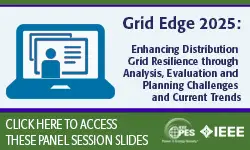Modern Grid-Interactive Buildings: Flexibility, Resilience, and Market Design
A. Parrado-Duque, Z. Song, X. Liu
-
Members: FreePES
IEEE Members: $25.00
Non-members: $40.00Pages/Slides: 65
Panel
18 Jul 2023
Buildings account for around 40% of energy demand across the globe. Recent decades have witnessed a surge of building-level communication, control, and electrification, which unlock a large set of distributed resources to enhance flexibility and resilience performance. Although these unexplored resources have great potential to improve building-to-grid integration, the existing energy management systems are less supportive and must be holistically redesigned in order to address the building-level challenges such as high-precision simulation, standardized modelling, automatic control, and cost-benefit trade-off issues. This panel will discuss the latest advances in modern grid-interactive buildings which are able to provide grid support functions, including energy balancing, energy sharing, voltage regulation, and resilience services. Speakers will be invited to share their global experiences in this area, with specific focus in deep learning, cloud computing, advanced demand response, resilience enhancement, flexibility pricing, and market design.
Presentations in this panel session:
- Grid-interactive efficient buildings to improve the resilience of an active distribution grid (23PESGM2791)
- Optimal design and economic assessment of a resilient building energy hub with second-life batteries (23PESGM2792)
- PEDF (photovoltaics, energy storage, direct current, flexibility), a building energy system for grid decarbonization: Progress and application in China (23PESGM2793)
Chairs:
Guangchun Ruan, Shunbo Lei
Primary Committee:
Smart Buildings, Loads & Customer Systems Committee (SBLCS)
Sponsor Committees:
Smart Buildings, Loads & Customer Systems


